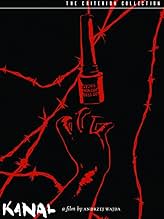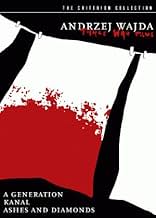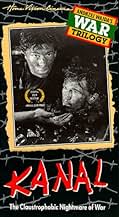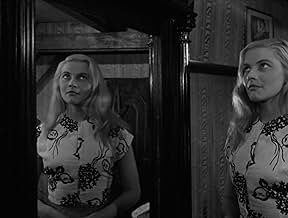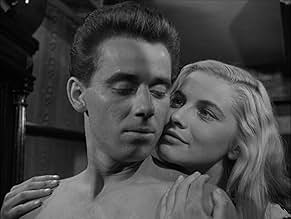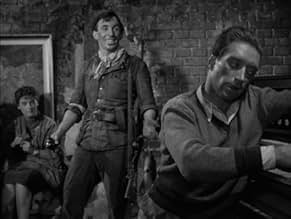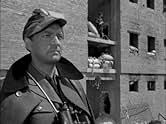IMDb-BEWERTUNG
7,9/10
8514
IHRE BEWERTUNG
1944 nutzen der polnische Leutnant Zadra und seine Widerstandskämpfer während des Warschauer Aufstands gegen die Nazis die Kanalisation Warschaus, um der Einkesselung durch die Deutschen zu ... Alles lesen1944 nutzen der polnische Leutnant Zadra und seine Widerstandskämpfer während des Warschauer Aufstands gegen die Nazis die Kanalisation Warschaus, um der Einkesselung durch die Deutschen zu entfliehen.1944 nutzen der polnische Leutnant Zadra und seine Widerstandskämpfer während des Warschauer Aufstands gegen die Nazis die Kanalisation Warschaus, um der Einkesselung durch die Deutschen zu entfliehen.
- Nominiert für 1 BAFTA Award
- 1 Gewinn & 2 Nominierungen insgesamt
Vladek Sheybal
- Composer Michal
- (as Wladyslaw Sheybal)
Wlodzimierz Bednarski
- Insurgent
- (Nicht genannt)
Zenon Dadajewski
- Insurgent
- (Nicht genannt)
Empfohlene Bewertungen
I think everyone who saw this film knows that it's a masterpiece, but maybe not everyone knows how authentic the film is. The writer of the screenplay - Jerzy Stefan Stawinski - is in fact the Lieutenant Zadra responsible for his platoon. Stawinski wrote down his own war experiences here with impressing honesty.
Another thing that may be interesting in this film is the main female character - Daisy. She isn't supposed to be a superwoman as some suggested. In fact there were several thousands of women fighting in this uprising. All of them that survived it were given the status of soldiers by Germans. It was the first time in the world's history when women received such a status. During the uprising many of them were carrying mail via sewers, so Daisy is rather a typical character in this role. It would be more surprising if the guide was a man.
Another thing that may be interesting in this film is the main female character - Daisy. She isn't supposed to be a superwoman as some suggested. In fact there were several thousands of women fighting in this uprising. All of them that survived it were given the status of soldiers by Germans. It was the first time in the world's history when women received such a status. During the uprising many of them were carrying mail via sewers, so Daisy is rather a typical character in this role. It would be more surprising if the guide was a man.
This is certainly NOT a feel-good film, as it deals with the horrors of the Nazis and their crushing of the Warsaw uprising of 1944. After all, there is no way or reason to make this a nice or fun movie to view. It just isn't possible. BUT, we are treated to an intensely realistic and viscerally disturbing film showing the war in all its awfulness. The first portion of the film is set in crumbling buildings and the nobility of the cause is apparent. However, the vast majority of the film is set in the sewers (hence the title "Kanal") and the characters, over time, lose some of their nobility and just ache to survive. The film is intensely claustrophobic and the filth they move about in literally looks like raw sewage--so as the characters fight for life and, in most cases, give up hope, you find yourself being pulled into their world and their terror. A great, though intensely awful film to watch. So, it comes as no surprise that I would not recommend this film to children or people afflicted with claustrophobia.
PS--if the musician seems familiar, it's because Wladyslaw Sheybal (also known as "Vladek Sheybal") is one of the Bond Villains in the movie FROM Russia WITH LOVE.
PS--if the musician seems familiar, it's because Wladyslaw Sheybal (also known as "Vladek Sheybal") is one of the Bond Villains in the movie FROM Russia WITH LOVE.
"Kanal" (Polish, 1957): This is the second of Andrzej Wajda's trilogy about WWII in Poland. I love the photography the light, the angles, the flowing camera movements. "Kanal" is about a group of resistance fighters and civilians who, out of necessity, band together to fight (what appears to be a losing battle) against the oncoming Nazis. First set in an incredibly bleak ruin of Warsaw, the story and acting only intensify as they begrudgingly try to escape through the underground sewer system. This one will take it out of you. It is relentless. It is relentless. It is relentless. It is relentless. Relentless. Relentless. Relentless. Relentless. Relentless. Relentless.
10begger
In many respects this movie is sheer brilliance. For starters "Kanal" describes the entire Polish Revolt in a single instance at the eve of its termination. But this movie is much more than a parable of Revolution and struggle. "Kanal" has great characters, great settings, great scenes, and, above all, an important message to be told.
What would it be like to fight an impossible battle against a larger force and be in the real world? What would it be like to face death at every turn and still travel on knowing defeat awaited you at the next bend? "Kanal" is the answer to these questions.
What would it be like to fight an impossible battle against a larger force and be in the real world? What would it be like to face death at every turn and still travel on knowing defeat awaited you at the next bend? "Kanal" is the answer to these questions.
That this movie was made is a near miracle, since it squeaked out barely 3 years after Stalin died; and the Polish film industry could even begin to suggest that Poles could struggle against the Germans without Soviet "fraternal" help. It looks likely that it was saved from oblivion by the Silver Palm (1957), at least in Poland. My suspicion that this got past the Party censors as a Dantean allegory about the worker and peasant struggles, with each character and episode exposing some lesson. However, like Ashes and Diamonds, much of the real message is just at the surface: regular Poles struggling for a better future.
The real hidden message of the film is a metaphorical struggle against Soviet oppression. Wajda seems to suggest this by quoting Szczepanski(1944): "... But know this: from our tombstones A victorious new Poland will be born And you will not walk this land You Red Ruler of bestial forces!" (1) Indeed the resolution suggests the Stalinist Inferno is far from over. Those who have tried to bring light to the world suffer a Promethean fate.
What seems remarkable to me is the positive spirit, humor, and love of life that most of the characters display in the face of their passage into the underworld. There is additional irony (humorous to me), for example, that the composer attempts to play a particularly patriotic Chopin, but is then ordered to play "something with feeling:" an inane dance tune. (By the way, the Beckstein piano that the composer tries to protect was made by a company that provided Hitler with crucial early support.)
It is also remarkable that such a dark, almost anti-heroic view of combatants was made only 12 years after the event. It is not so far from the spirit of Ernie Pyle, and just think how long it took to make Band of Brothers.
(1) Interview on www.wajda.pl
The real hidden message of the film is a metaphorical struggle against Soviet oppression. Wajda seems to suggest this by quoting Szczepanski(1944): "... But know this: from our tombstones A victorious new Poland will be born And you will not walk this land You Red Ruler of bestial forces!" (1) Indeed the resolution suggests the Stalinist Inferno is far from over. Those who have tried to bring light to the world suffer a Promethean fate.
What seems remarkable to me is the positive spirit, humor, and love of life that most of the characters display in the face of their passage into the underworld. There is additional irony (humorous to me), for example, that the composer attempts to play a particularly patriotic Chopin, but is then ordered to play "something with feeling:" an inane dance tune. (By the way, the Beckstein piano that the composer tries to protect was made by a company that provided Hitler with crucial early support.)
It is also remarkable that such a dark, almost anti-heroic view of combatants was made only 12 years after the event. It is not so far from the spirit of Ernie Pyle, and just think how long it took to make Band of Brothers.
(1) Interview on www.wajda.pl
Wusstest du schon
- WissenswertesDirector Andrzej Wajda was himself a fighter in the Polish resistance movement against the Nazis in World War II and several scenes in the film were based on his experiences.
- PatzerWhen Korab is attacking Goliath self-propelled tracked mine, a wire pulling it can be seen.
- Zitate
Narrator: These are the tragic heroes: watch them closely in the remaining hours of their lives.
- VerbindungenFeatured in Vieras (1984)
Top-Auswahl
Melde dich zum Bewerten an und greife auf die Watchlist für personalisierte Empfehlungen zu.
- How long is Kanal?Powered by Alexa
Details
- Erscheinungsdatum
- Herkunftsland
- Offizieller Standort
- Sprachen
- Auch bekannt als
- Kanal
- Drehorte
- Produktionsfirma
- Weitere beteiligte Unternehmen bei IMDbPro anzeigen
- Laufzeit
- 1 Std. 31 Min.(91 min)
- Farbe
- Sound-Mix
- Seitenverhältnis
- 1.37 : 1
Zu dieser Seite beitragen
Bearbeitung vorschlagen oder fehlenden Inhalt hinzufügen

